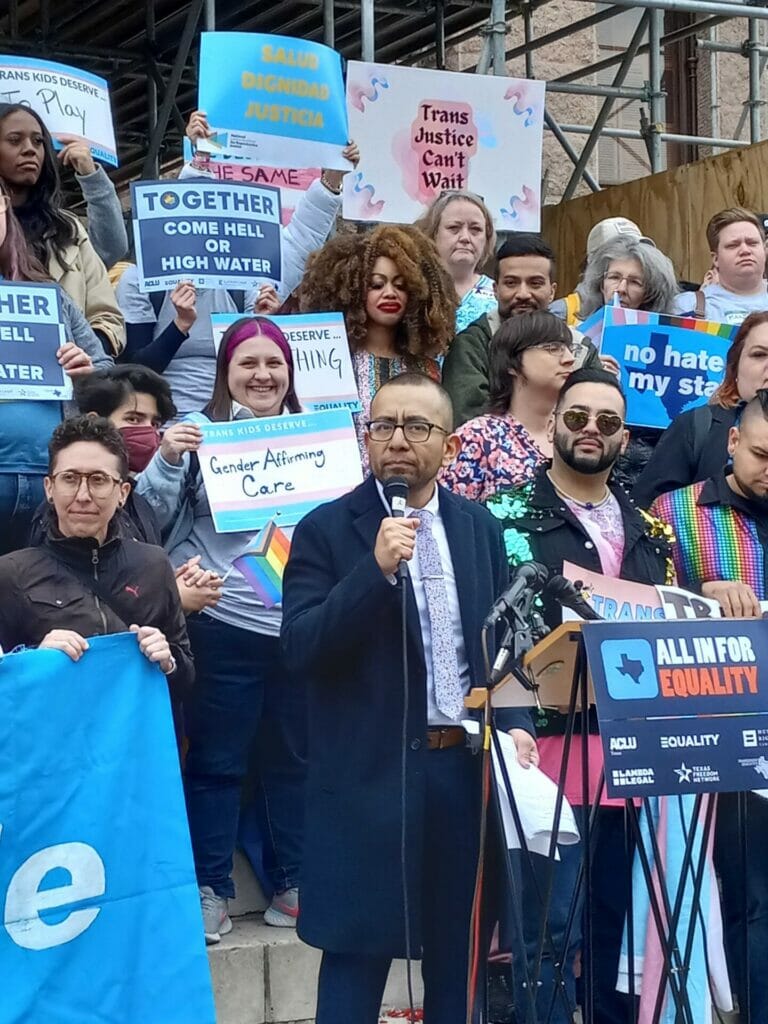With the holiday break over, a number of state legislatures are reconvening starting this week to hold their 2025 sessions, and LGBTQ-related bills and policies are already on the docket in many states.
Massachusetts, Montana, Ohio, Wisconsin, Kentucky, Minnesota, North Dakota, Pennsylvania, Rhode Island, Colorado, Connecticut, Illinois, Maryland, Michigan, Mississippi, Missouri, Nebraska, New Hampshire, New York, Vermont, Virginia, and West Virginia are all states where legislators have already started meeting again to consider legislation for the new year. According to the Trans Legislation Tracker, there have been 115 trans-specific bills prefiled in 2025 as of early this week. The state-level bills are especially heavily concentrated in places like South Carolina, Texas, and Missouri and would affect transgender people in various aspects of their lives such as in health care, education, and access to restrooms. Should the trend of bills follow like those introduced last year, other attacks may affect censorship in schools around LGBTQ issues and our community’s freedom of speech and expression more broadly.

In Texas, anti-equality lawmakers proposed 32 anti-transgender bills on the very first day of pre-filing for 2025. It’s important to remember that the influx of bills can be partly attributed to Texas’ legislative session only taking place once every other year. Lawmakers are hurrying to make up for lost time, but advocates are continuing the work to limit the pathway forward for harm.
In Georgia, where the legislature returns to session on Jan. 13, lawmakers are expected to again consider anti-LGBTQ legislation that failed to become law last year, including codifying in the legislature a ban on allowing transgender youth to participate in school sports. Opponents of transgender inclusion claim to support the legislation to protect cisgender girls – yet studies show that when transgender students play sports, levels of participation go up for all students, including cisgender girls.
In Indiana, some lawmakers are seeking to expand existing restrictions on transgender participation in sports. HB 1041 would ban transgender students from participating in college sports and require notification by any team outside of the state engaged in competition about inclusion of a transgender participant. The measure will likely be brought to its first committee next week.
Although most states adjourned for the holiday, one notable exception was Ohio, which passed an extreme bill requiring educators to forcibly out LGBTQ students to their parents even without their consent. Advocates have launched a veto campaign urging Ohio’s governor, Mike DeWine, not to sign the bill. He has until January 9 to make a decision; and the bill becomes law if he does nothing.
View this post on Instagram
Despite what seems like a distressing landscape on the state level, there’s a lot of promise for wins in the courts in ways that are wider ranging in scope and magnitude than before, and which can slow down or negate the impact of state-level restrictions that are already in place. Most recently in mid-December, the Montana Supreme Court affirmed a lower court ruling that blocked a state law prohibiting certain types of health care for transgender youth; and a state district court blocked enforcement of a ban on allowing transgender and nonbinary people to update their gender markets on drivers’ licenses and birth certificates.
These lower court decisions follow a pattern: In almost every case on transgender health care that has considered the benefits of health care for transgender people, federal courts have affirmed the importance of health care for transgender people — even among Republican- and Trump-appointed judges in conservative states.

In just early December, the U.S. Supreme Court heard oral argument in U.S. v. Skrmetti, which challenges the constitutionality of a ban on health care for transgender youth in Tennessee while cisgender youth continue to enjoy access to the same care. According to Media Matters, the day of the oral argument led to a slew of major TV networks featuring transgender Americans that haven’t previously done so, increasing visibility and understanding about the community. The justices are expected to issue a ruling in June 2025 which could affect the status of bans in almost half the country.
In other good news, out LGBTQ state lawmakers who made history this past election are also beginning their terms in the upcoming weeks. These include Molly Cook, the first out LGBTQ member of the Texas State Senate; Kristin Alfheim, the first LGBTQ+ person to represent the Fox Valley in the Wisconsin State Senate; Rashaun Kemp, the first out gay Black man elected to the Georgia state legislature; and others who will proudly represent and build visibility for our community.
GLAAD is monitoring and will be raising awareness and actions in response to high-priority bill movement that affects our community. To keep track of when your state goes into session, check out the full calendar from the National Council of State Legislatures here; and sign up for GLAAD’s email list and social media channels to ensure you don’t miss any important updates.













